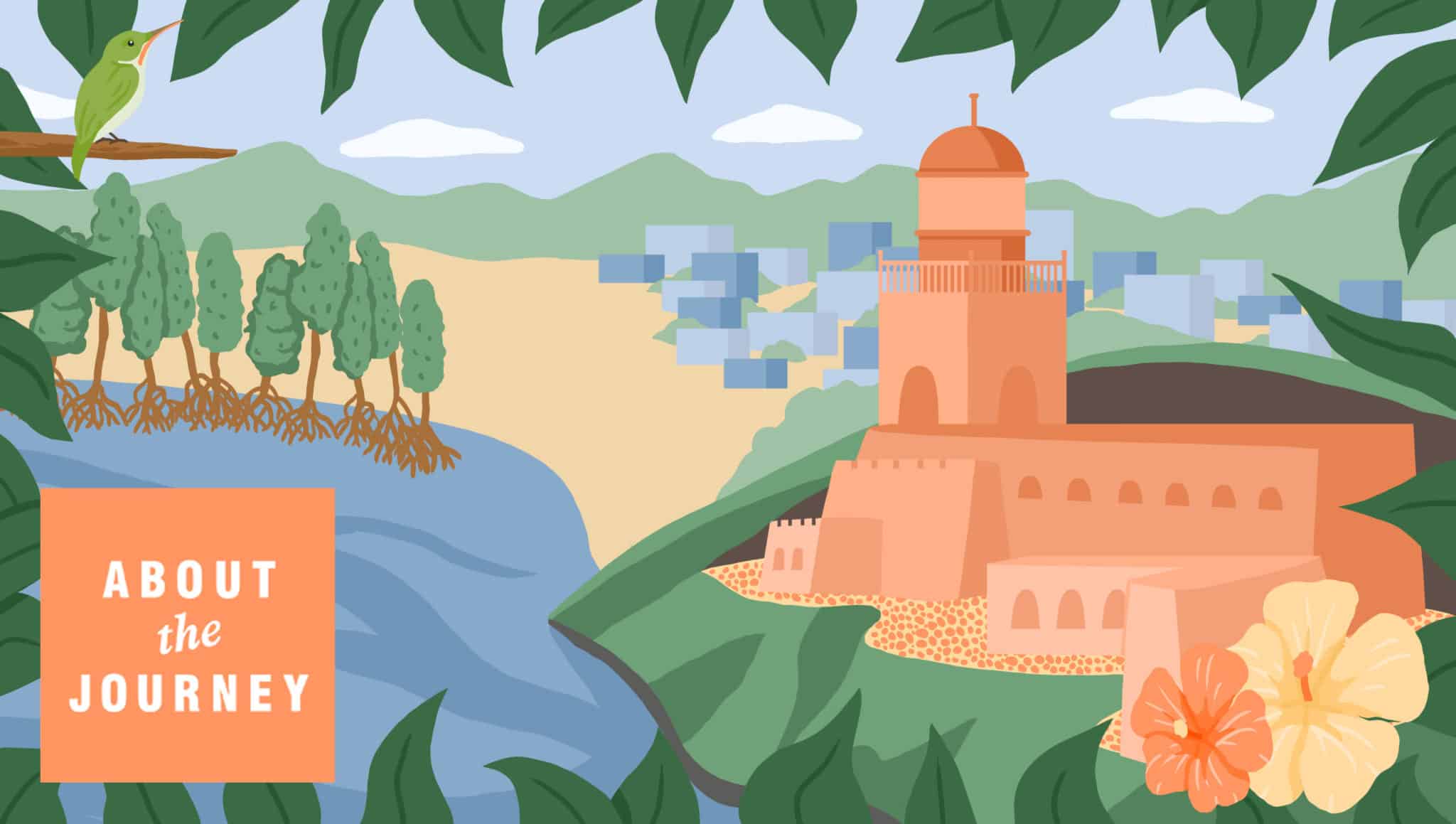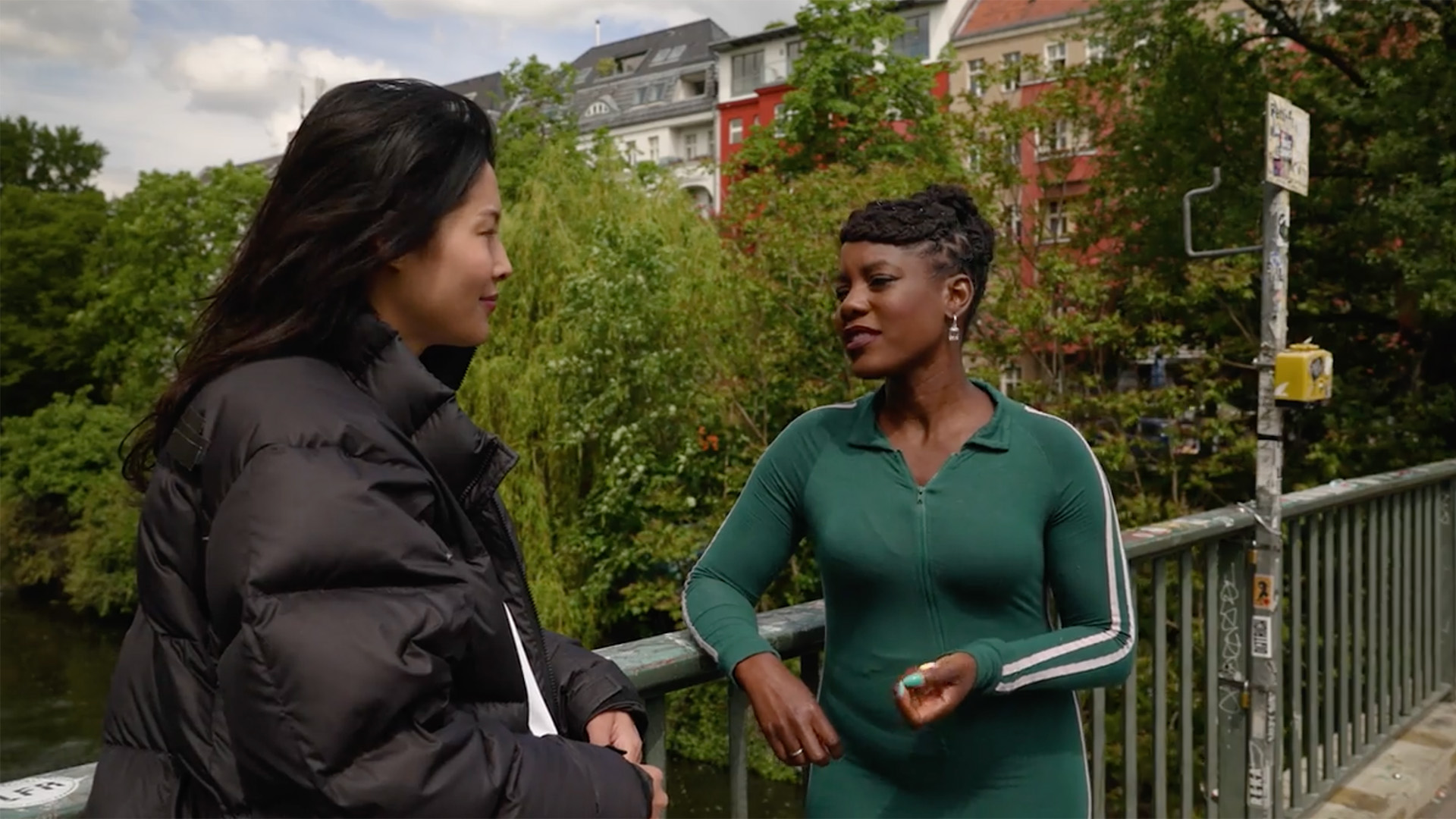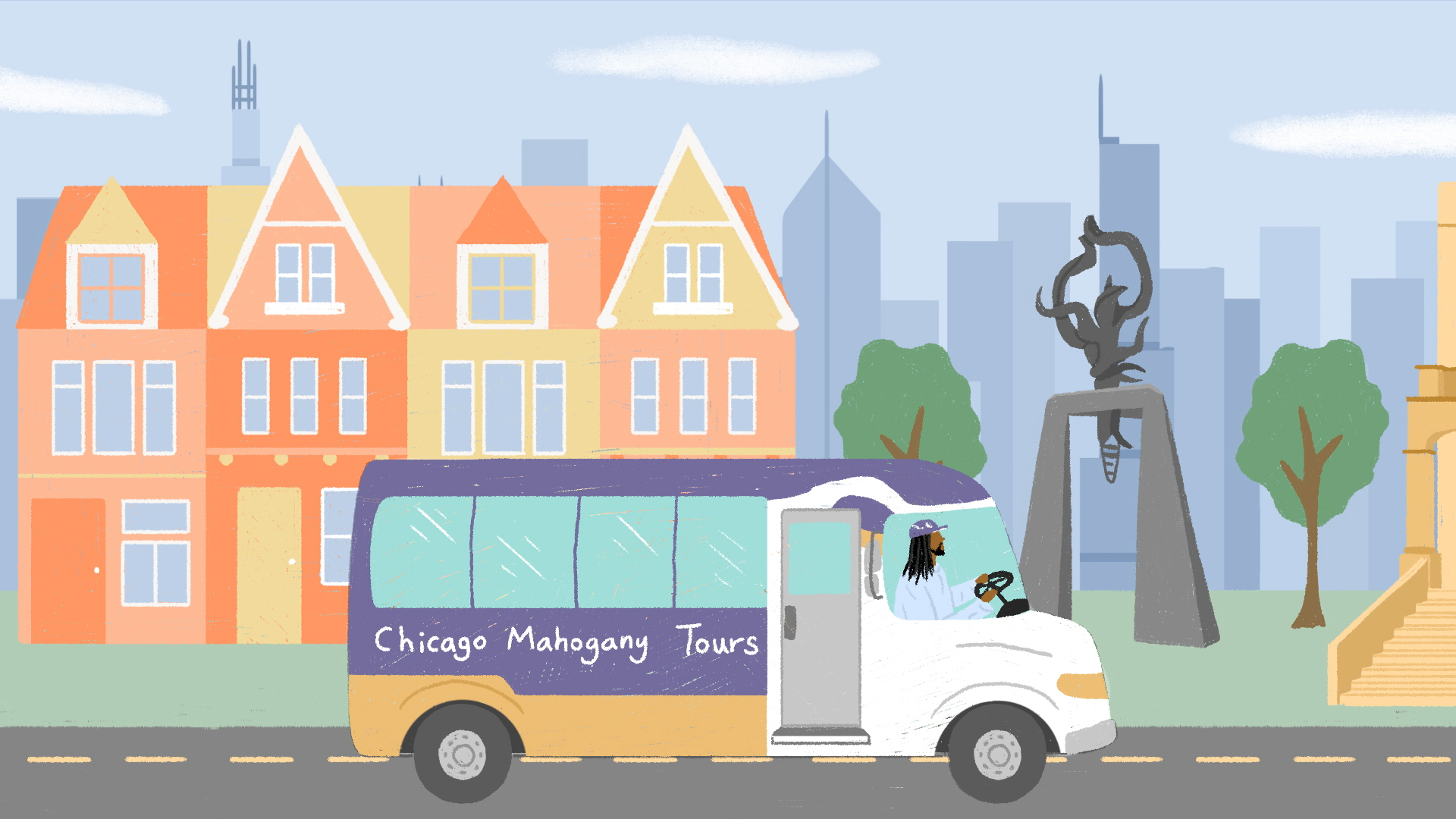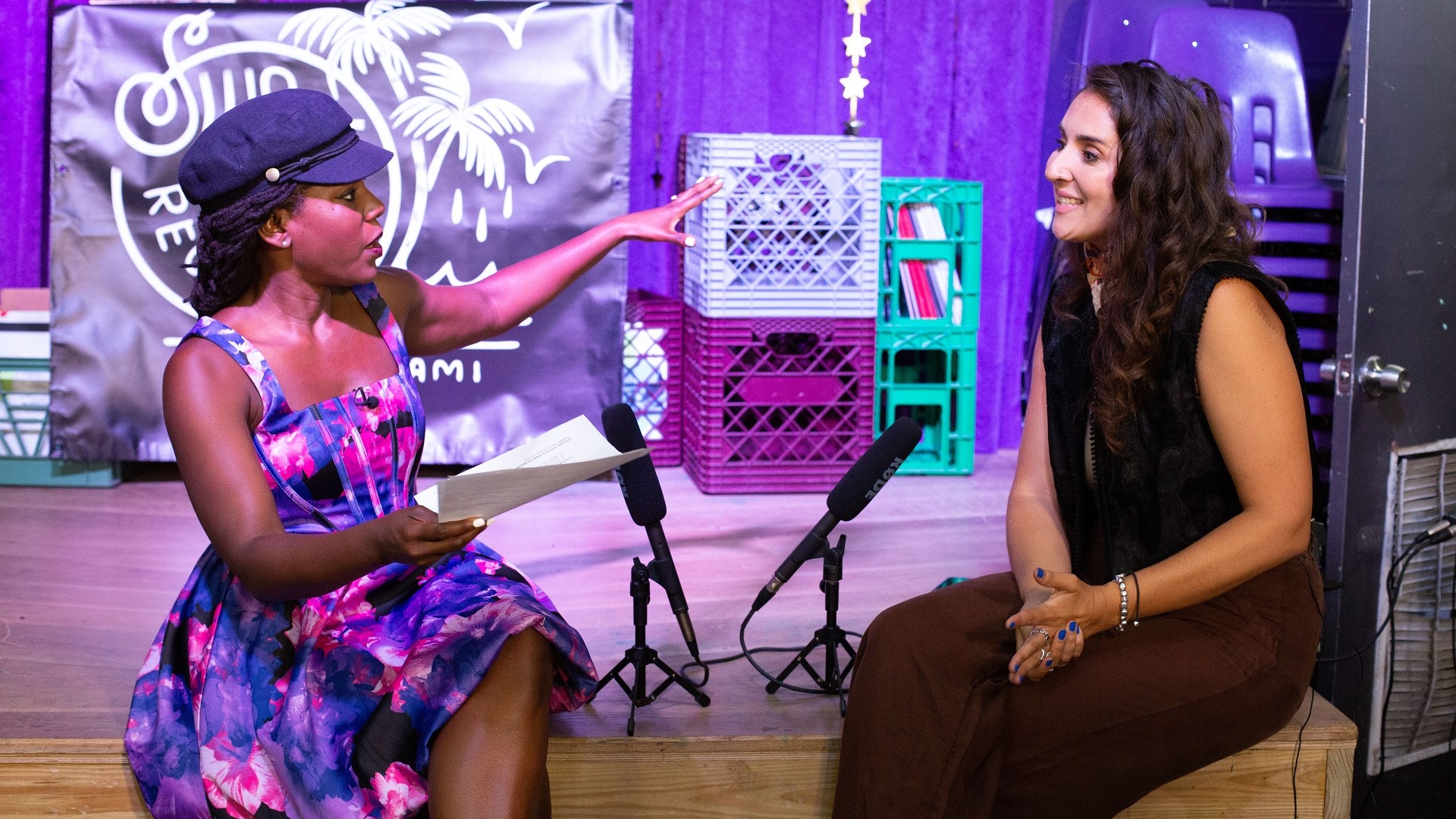
(Illustration: Yeji Kim)
About the JourneyRestoring the Red Mangroves of Puerto Rico’s Laguna del Condado
By Taylor WoodyOneika dials into Puerto Rico to talk about regenerative travel with Carmen Portela and Iris Landruá of Local Guest, a tourism agency that connects visitors to sustainable experiences.
She’ll learn about the rich natural beauty of the Caribbean island and hear how Local Guest is partnering with locals to share their knowledge of the island with visitors looking to travel more consciously.
Carmen and Iris give us insight into how nature and city life collide in San Juan, something they felt acutely when hurricanes Irma and Maria devastated their home island only a month after launching the business. We hear how Local Guest went from travel agency to relief organization, and how that spirit of rebuilding community lives on in everything they do.
Then, we’ll wade into the red mangrove forests that line Laguna del Condado for a reforestation tour with Coalición Restauración Ecosistemas Santurcinos, or CRES. Yvette Núñez, executive director of CRES, will share why these coastal trees are so vital to protecting Puerto Rico’s coastline and help visitors take part in planting new seeds.
Along the way, we’ll also get turned on to lesser-visited parts of Puerto Rico, like the mountains in Utuado and Adjuntas in the center of Puerto Rico, or the great views from Pico Rodadero and the striking landscape of the Guánica dry forest in the southwest.
PODCAST TRANSCRIPT
Carmen Portela: I think that as we grow up, we understand the importance of the conservation of our, of our natural resources. So our future generations can enjoy, can be part of it and can, um, It cannot outlive us, right.
Oneika Raymond: Welcome to season two of About the Journey. I’m your host, Oneika Raymond, a travel journalist and member of Marriott Bonvoy. This season I’m exploring what it means to travel better, and I’m doing it with the help of the people who know their hometowns best.
Today, I’m sitting down with Carmen and Iris of Local Guest, a women-led tourism agency in Puerto Rico that connects visitors to sustainable and regenerative experiences.
Carmen Portela: This is the only place that we have. This is our island. and if we don’t preserve it, who’s gonna do it.
Oneika Raymond: This is San Juan, Puerto Rico and regenerative travel.
Local Voice 1: It’s a beautiful island to start with, with beaches and of course, great mountains. Seventy-five percent of Puerto Rico is mountainous.
Local Voice 2: Some of the things I like to do here is kite surfing, sailing, scuba diving, anything in the water, basically.
Local Voice 3: I think Puerto, Rican’s ready to welcome you. They call it enchanted island and it is.
Oneika Raymond: I couldn’t travel to Puerto Rico for today’s episode. Instead I’m in a studio in far away Toronto.
Gale Straub: You’ve, you’ve been to Puerto Rico before, right, Oneika?
Oneika Raymond: I have.
Oneika Raymond: That’s me with my producer, Gale.
Gale Straub: In this conversation that you’re about to have with Carmen and Iris about sustainable travel, is there anything that you’ve started to see as a very, very, very frequent traveler? Any trends that you’ve noticed around sustainable travel?
Oneika Raymond: I think that as a whole, as travelers, we’re becoming more conscious of the necessity of being more sustainable when we travel. I think people are really taking note of their practices and how they act when they go places and I think they’re aware of the footprint that they’re making when they do travel. And I think that awareness is always key. I think awareness is kind of the seed that’s planted and we hope that it grows into action.
Gale Straub: Mm, absolutely. So there’s been a lot of conversation around sustainable travel versus regenerative travel, which is kind of taking the trend of sustainable travel one step further. It’s this idea of not just minimizing your footprint, you know, not just like buying carbon offsets, or maybe thinking about that single-use plastic, but making the places that you travel even better than they were before. So leaving it better than they found it, which is that old campsite rule.
Oneika Raymond: Mm-hmm, I think as travelers in the past, we have been so focused on making destinations our next conquest, you know, going and checking things off the bucket list and then just leaving and not really thinking about the impact we have or not really thinking about the footprint, uh, literal and figurative that we’re leaving. And I think that’s always the fundamental problem, right? You’re going somewhere as a visitor. So you don’t have local insights. You don’t have local connections. And so Local Guest pairs the traveler with somebody who knows, with somebody who is intimately aware and intrinsically connected to that place. And so combining forces in that way really helps to propel this idea of regenerative travel and helps to make it a reality.
Gale Straub: Mm, absolutely. Alright, I’m going to patch them in.
Oneika Raymond: All right. So I think we’re, we’re set up.
Oneika Raymond: Carmen and Iris, thank you so much for joining me on the podcast.
Carmen Portela: Hi, thank you for having us.
Oneika Raymond: So first, can you both please introduce yourselves and your roles within Local Guest.
Carmen Portela: Yeah, my name is Cameron Portela. I’m the founder of Local Guest.
Iris Landruá: And my name is Iris Landruá. I’m a group coordinator at Local Guest.
Oneika Raymond: So, what exactly is Local Guest? What do you do and what is your mission?
Carmen Portela: Yeah, from our inception, Local Guest is a tour operator based on sustainability. We work with community entrepreneurs to offer sustainable tourism experiences. The experience providers – they have their own missions. They know what they’re, they’re looking for. They’re looking to conserve a mangrove. They’re looking to maintain trailings in a yunque rainforest. They’re looking to offer farming operations for their farm to continue. So when we work with this provider, every single one has a mission that all has to be with sustainability. And second, what the traveler is paying is actually staying in the community. We think about every step of the way. So it goes through that whole process of creating fair trade options where the money that the travelers spend at a destination really stays in the local communities.
Iris Landruá: As Carmen said, we always try to do the best that we can by the community. We have a local project of Taino pottery. This is a woman that does pottery classes in her own home, and she’s one of the last people on the island that is a physical manifestation of our Taino heritage. And we want people to know about her for Puerto Rico as showing a different part of our cultural history as the, you know, history that we have. So when we try to do fair by her, we explain that it is okay to ask for a fair price. It’s okay to ask for what the value that your experiences is.
Carmen Portela: Mm-hmm, and the right traveler will pay for it.
Oneika Raymond: And the right traveler will pay. Words to live by. I think that’s so important. Sometimes there just needs to be alignment with, with the traveler and the person offering the service. And if there’s a mismatch, well, so be it. You will find someone else who finds value in that service. And I think that’s the empowering part about what you are doing. Now, Puerto Rico I’ve actually been before. I’ve been twice and I love it. But for those people who haven’t been, how would you describe it?
Carmen Portela: In a couple of words, I will say that Puerto Rico is obviously based in the Caribbean and we are a very cultural, vibrant destination where our music, our food and our natural resources are like the stars, right? And then you combine it with Puerto Ricans, which we are very lively and really enjoy life and enjoy our country. So it’s a wonderful destination to come and immerse yourself in everything that is a boricua, right – a Puerto Rican.
Oneika Raymond: Iris, what do you say?
Iris Landruá: I think we always try to look at the good side of everything, even when we’re in turmoil or having a hard day or hard times, so I think that’s why people that visit us say that we’re very happy people. We’re very welcoming. We’re very housewarming to everyone that talks to us or visits us.
Oneika Raymond: Mm, I love that. Now, San Juan is the island’s capital. And it’s the place that people visit the most when they come to Puerto Rico. So Carmen, how would you describe San Juan to somebody who has never been?
Carmen Portela: I will say Old San Juan is, and I may be biased, but it’s enchanting. I think it’s one of the most beautiful cities in the world. A city full of cobblestones with amazing restaurants, bars, an amazing cocktail scene and a lot of culture offerings.
Oneika Raymond: I would have to agree. It’s really, it’s really gorgeous. But with that being said, there’s so much more to see outside of San Juan. So Iris, other parts of Puerto Rico, which areas would you recommend?
Iris Landruá: I think the center, and the southwest part of Puerto Rico. In the center is full of mountains and amazing views. If you’re an avid hiker and love being in the outdoors, the center of Puerto Rico is the place – Utuado, Adjuntas. And for the southwest of Puerto Rico, there’s a mountain called Pico Rodadero that you have like an amazing view of all the south part of Puerto Rico in one of the highest points in Jacó.
Oneika Raymond: Why do you think it’s important to visit these lesser-known places?
Iris Landruá: I think it’s very important because Puerto Rico is more than San Juan. It’s more than the metropolitan area. We have, as I said, mountains, we have waterfalls, we have rivers, we have rainforests. We have amazing beaches outside of San Juan and in the west coast, too, in Isabela, Rincón.
Carmen Portela: Yeah, Puerto Rico’s extremely biodiverse. you have mangroves, of course you have beaches, but then also you have desert-like environments, like the Guánica dry forest, where you actually have very much a desert-like environment there. So our environment is so diverse by such a small island.
Oneika Raymond: Mm, thank you so much for sharing that. So what type of relationship do Puerto Ricans have to nature and, and all of these beautiful natural wonders?
Carmen Portela Well, we are an island. Nature is all around us. It’s just part of how we grew up. It’s just, it’s just our backyard. So that love for nature goes directly tied into understanding that we are nature as humans. Maybe if you’re from a big city, you appreciate nature when you go see it. But when you’re from an island, nature is all around you, all the time.
Oneika Raymond: So, Iris, tell me about CRES’s mangrove reforestation tour.
Iris Landruá: Sure, CRES, they basically document different ecosystems to determine possible problems and use methods of restoration and conservation. So one of the projects that they work on is the mangroves, because this is a big problem, the coastal erosion that happens in the island. It is impacted through tourism in a way. So this local project tries to restore the things that can be damaged as a way of mass tourism.
Yvette Núñez: See how the erosion has been impacting the area for the walkers and also the bikes.
Oneika Raymond: That’s Yvette Núñez you’re hearing over the traffic, the executive director of CRES, a community organization dedicated to conserving the ecology of Santurce, the most populous barrio in the capital. She’s pointing out areas of coastal erosion along Condado Beach.
Yvette Núñez: Is it your first time here, right? [tour attendee responds in the distance] Yeah.
Oneika Raymond: In her eight years with CRES, she’s met thousands of travelers who’ve come by way of Local Guest.
Yvette Núñez: So today we are going to be walking and also paddling around the lagoon. We will see different types of mangroves like the ones that Juan showed you. They like the water because this red mangrove is created to be walking to the water and creates earth, creates soil because it’s attracting every soil sediment to their roots and helps with the problem of sedimentation in the city. So that protects us against the waves and against the swells and the hurricanes. And then after Maria, they suffer a lot. That’s why we are trying to put more trees in our coastal areas.
Local Voice 1: Hurricane Maria affected us tremendously. It came in through the balcony. So it was just blowing through the apartment for 13 hours. And we lived in the 18th floor. And water and sand and waves were happening all at once inside the apartment.
Local Voice 2: I remember watching the news and it was worse than that. I remember going every day out and cleaning trees, moving stuff out of the street and yeah, it was tough, but people got united.
Oneika Raymond: So Carmen, Local Guest was launched just one month before Hurricane Irma and Hurricane Maria devastated the island. What was it like to found a tourism-focused business in the wake of these hurricanes?
Carmen Portela: I mean, it was devastating. It is interesting because when we talk about launching Local Guest a month before the hurricane – so we actually became a relief effort company for the first six months. We, through volunteers and ourselves, our day-to-day was to figure out – Where can I find rice? Where can I find corned beef? Or where can I find any type of food? – so it was literally a relief and supply operation of vans. I mean, this is something that we have never done in our lives, but when there’s necessity and we had those contacts, I think this, like when there’s people suffering, there’s no way to not become what is needed. And that’s what we, as a team, became. We were five women that literally had, day in and day out, like 20 to 30 volunteers assisting us. And in six months, I think we served more than like 25,000 meals. And when we look back, we were just on autopilot.
Iris Landruá: Yeah, it was just, what are we gonna do? Or, how we can be of service? Or, what does the community need? So as people knew about us, that we had that direct contact with community organizations and leaders, they started to reach out to us. They knew that we worked directly with the people that needed the most help. We basically walked the streets house to house just serving food and water.
Local Voice 3: I call it the Island of Light. Light – the one thing that was taken away by the hurricane, was light. But now, the people have been able to recover the light of life, right? Enjoying what they were missing coming back again. But not only that. People learned to relate to each other in a very, very close way.
Carmen Portela: Two or three months after Hurricane Maria, we were like, “Hey, there’s a lot to be talked about capacity building and education in the tourism industry that is not as easy, or there’s not that much funding for it. So that’s how Love in Motion came about. We have a sister nonprofit that works with capacity building in education around sustainable tourism offering courses, offering training, offering certifications – and now it actually has shifted a bit and it has become a conservation nonprofit. So, how do we create enough momentum in order for operations to be able to be sustained? Because we know this is necessary in Puerto Rico. So I think the last couple of years for us, the main challenge has been, how do we sustain ourselves?
Oneika Raymond: Right. And I guess, what hopes and dreams do you have, for the future of Puerto Rico and the preservation of all the beauty that the island holds?
Carmen Portela: Hmm, I think stronger environmental protection laws need to be placed in, because if not, we’re gonna be a concrete island – and who comes to a concrete island, right? I’m happy that sustainability and community-based tourism now has been a forefront for the tourism company, but in the past, it wasn’t. So for a long time, we felt that we were speaking to the walls. So from our standpoint, we will continue to enforce sustainability, continue to scream about the importance of nature conservation, because this is the only place that we have. This is our island. And if we don’t preserve it, who’s gonna do it? I’m not a mom, but I think about future generations. And I think that comes for being a good human, right? And for the future, I wish that all the tourism operations in Puerto Rico will be 100% sustainable.
Oneika Raymond: That’s all for this episode of About the Journey. A big thank you to Carmen and Iris of Local Guest for speaking with me. And thanks also to Yvette from CRES.
Next week, I’m dusting off my cowgirl boots and saddling up at the Texas Black Invitational Rodeo.
Rodeo Announcer: Alright Mr. Lloyd!
Oneika Raymond: Woah!
Oneika Raymond: Uh-oh, honestly, if you don’t pay attention, you’ll miss it.
Rodeo Announcer: You see that happening, he was reaching.
Oneika Raymond: About the Journey is produced by Marriott Bonvoy Traveler, AT WILL MEDIA and me, Oneika Raymond. Our Marriott producers are Robin Bennefield and Jess Moss.
Our AT WILL MEDIA producers are Kait Walsh, Kristy Westgard, Gale Straub, and Tina Turner. Editing by Greg Deavens II. To learn more about sustainable travel with Local Guest, visit their website at www.localguest.com and to join CRES on their mangrove reforestation tour, or lots of other eco focused experiences, visit www.crespr.com.
You can learn more about visiting Puerto Rico and get other conscious travel tips from Marriott Bonvoy. And if you like this episode of About the Journey, please be sure to rate, review and subscribe wherever you get your podcasts. I’m your host, Oneika Raymond. See you next week.







